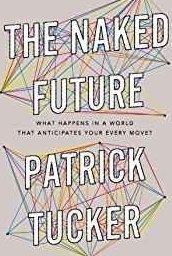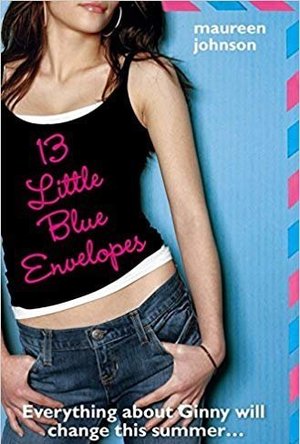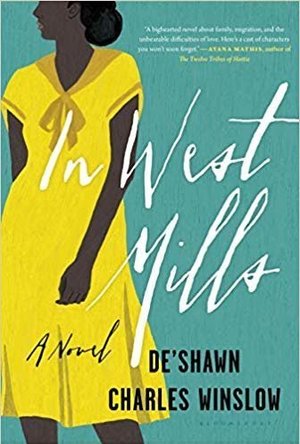Search
Search results
Alice Waters recommended A Pattern Language: Towns, Buildings, Construction in Books (curated)
BookblogbyCari (345 KP) rated The Naked Future in Books
Aug 5, 2018
Book Review by Cari Mayhew. Rating 7.5/10
This is a book about how the digital footprint we leave behind us can be used to make predictions about our future in all aspects of our lives. But are we seeing the coming to being of a dystopian science fiction, or are we tapping into a new superpower?
Every app on every device we use leaves a digital trail about us, and this has implications in the fields of medicine and the spread of infections, education and learning, and crime prediction, through to movie preference and dating.
The book predominantly examines the value to society in general but also looks at the benefits to the individual. Of course, these benefits come at a cost to our privacy, which the book also briefly addresses. Each chapter is centered on its own topic. I will mention each but in the interests of brevity won’t go into detail on each topic.
Chapter 1 begins by describing how certain apps can be extremely useful warning providers, but by the end of the chapter, we are looking at how your smartphone apps can be used to locate you, even when your GPS is turned off and you’re not geo-tagging posts or tweets. With modern statistical models and enough data points, it’s possible to predict where you will be down to the hour and within a square block one and a half years from now. Turning off your GPS doesn't actually make you less predictable, it just makes your predictability level harder to detect - your future remains naked.
Similarly, in Chapter 2 which examines deliberate self-tracking, Tucker notes that Fitbit users who are confused or ignorant of the device’s privacy settings are inadvertently sharing the data details of their sexual activity.
This seems like frightening stuff, but then the conversation turns to more benevolent uses of such technology. Chapter 3, by way of an imagined story, examines how such technology can be used to predict the spread of dangerous infections, including the identification of new strains of virus as new mutations occur.
Chapter 4 looks at the use of such technology in weather forecasting, and how it’s been used to make way for insurance against the effects of the weather for affected businesses. Chapter 5 explores how movie/book choice and ratings can be used to predict what makes a good movie/book.
We go back to the frightening stuff in Chapter 6. Here Tucker talks about how the smartphone has become the ultimate shopping accessory. Knowing what habitual time an individual wants a coffee, cig, or beer, is ideal for online advertisers, who will be able to send you a voucher/coupon or a mere suggestion right there on the spot. There could also be surveillance systems examining what you pick up and consider buying but don't put into basket /trolley. Tucker goes on to describe how data brokers such as Acxiom have begun selling on to advertisers access to not only your data to also to your future decisions.
Chapter 7 looks at education and learning, and makes the following good points: “What telemetric education offers is the chance for all students to raise their hands and be heard, without fear of confirming some unflattering, broadly held perception about their social group.” And “Imagine for a moment the power of knowing beforehand how well you would perform on a test but how disempowered you would feel if that same future was naked to your competition, or to your future potential employers.”
I like the title of chapter 8 “When Your Phone Says You’re In Love”. Here Tucker tells how online dating sites have become a living social science lab. Again here your personal details can be sold on. In the future, you could be rating your actual get-togethers on the app. Already invented is a “sociometer” which detects unconscious biological signals which show what role you’re taking in a conversation, and can then produce predictions on how the rest of the conversation will go.
Chapters 9 and 10 look at predictions in the where, when and who of acts of crime. He discusses where it has worked so far. But on this Tucker says “Predictive policing in the wrong hands looks less like a boon to public safety and more like a totalitarian hammer.”
The book concludes with Chapter 11, titled “The World That Anticipates Your Every Move”. Here one interviewee said as “Privacy is a blip on the radar of history.” Indeed the chapter ends with an obituary to privacy, where Tucker says “we will feel increasingly powerless against the tide of transparency rendering this planet in a new form as surely as the movement of glaciers carved our canyons and valleys.”
I’ve highlighted here the more worrisome aspects of the topics, but it’s important to note that Tucker does aim to offer a prescription for the situation, though it’s spread out in occasional paragraphs here and there rather than as a useful reference at the end. That said I found the actionable advice was rather brief and unoriginal.
Tucker presents a fair and balanced view of this important and highly relevant topic of our times, and the book is clearly well-researched. Some chapters show a little humor which was fun, but although the book is aimed at the layman, I often felt like I was reading a science textbook. The book is a real eye-opener, especially if it’s something you hadn’t given much thought to. The overall message of the book is clear: our data is already out there, but it’s ours first and foremost, and we can be savvy and use it to our advantage.
This is a book about how the digital footprint we leave behind us can be used to make predictions about our future in all aspects of our lives. But are we seeing the coming to being of a dystopian science fiction, or are we tapping into a new superpower?
Every app on every device we use leaves a digital trail about us, and this has implications in the fields of medicine and the spread of infections, education and learning, and crime prediction, through to movie preference and dating.
The book predominantly examines the value to society in general but also looks at the benefits to the individual. Of course, these benefits come at a cost to our privacy, which the book also briefly addresses. Each chapter is centered on its own topic. I will mention each but in the interests of brevity won’t go into detail on each topic.
Chapter 1 begins by describing how certain apps can be extremely useful warning providers, but by the end of the chapter, we are looking at how your smartphone apps can be used to locate you, even when your GPS is turned off and you’re not geo-tagging posts or tweets. With modern statistical models and enough data points, it’s possible to predict where you will be down to the hour and within a square block one and a half years from now. Turning off your GPS doesn't actually make you less predictable, it just makes your predictability level harder to detect - your future remains naked.
Similarly, in Chapter 2 which examines deliberate self-tracking, Tucker notes that Fitbit users who are confused or ignorant of the device’s privacy settings are inadvertently sharing the data details of their sexual activity.
This seems like frightening stuff, but then the conversation turns to more benevolent uses of such technology. Chapter 3, by way of an imagined story, examines how such technology can be used to predict the spread of dangerous infections, including the identification of new strains of virus as new mutations occur.
Chapter 4 looks at the use of such technology in weather forecasting, and how it’s been used to make way for insurance against the effects of the weather for affected businesses. Chapter 5 explores how movie/book choice and ratings can be used to predict what makes a good movie/book.
We go back to the frightening stuff in Chapter 6. Here Tucker talks about how the smartphone has become the ultimate shopping accessory. Knowing what habitual time an individual wants a coffee, cig, or beer, is ideal for online advertisers, who will be able to send you a voucher/coupon or a mere suggestion right there on the spot. There could also be surveillance systems examining what you pick up and consider buying but don't put into basket /trolley. Tucker goes on to describe how data brokers such as Acxiom have begun selling on to advertisers access to not only your data to also to your future decisions.
Chapter 7 looks at education and learning, and makes the following good points: “What telemetric education offers is the chance for all students to raise their hands and be heard, without fear of confirming some unflattering, broadly held perception about their social group.” And “Imagine for a moment the power of knowing beforehand how well you would perform on a test but how disempowered you would feel if that same future was naked to your competition, or to your future potential employers.”
I like the title of chapter 8 “When Your Phone Says You’re In Love”. Here Tucker tells how online dating sites have become a living social science lab. Again here your personal details can be sold on. In the future, you could be rating your actual get-togethers on the app. Already invented is a “sociometer” which detects unconscious biological signals which show what role you’re taking in a conversation, and can then produce predictions on how the rest of the conversation will go.
Chapters 9 and 10 look at predictions in the where, when and who of acts of crime. He discusses where it has worked so far. But on this Tucker says “Predictive policing in the wrong hands looks less like a boon to public safety and more like a totalitarian hammer.”
The book concludes with Chapter 11, titled “The World That Anticipates Your Every Move”. Here one interviewee said as “Privacy is a blip on the radar of history.” Indeed the chapter ends with an obituary to privacy, where Tucker says “we will feel increasingly powerless against the tide of transparency rendering this planet in a new form as surely as the movement of glaciers carved our canyons and valleys.”
I’ve highlighted here the more worrisome aspects of the topics, but it’s important to note that Tucker does aim to offer a prescription for the situation, though it’s spread out in occasional paragraphs here and there rather than as a useful reference at the end. That said I found the actionable advice was rather brief and unoriginal.
Tucker presents a fair and balanced view of this important and highly relevant topic of our times, and the book is clearly well-researched. Some chapters show a little humor which was fun, but although the book is aimed at the layman, I often felt like I was reading a science textbook. The book is a real eye-opener, especially if it’s something you hadn’t given much thought to. The overall message of the book is clear: our data is already out there, but it’s ours first and foremost, and we can be savvy and use it to our advantage.
Christine A. (965 KP) rated Love my home: 99 clutter-free tips in only 10 minutes a day in Books
Dec 9, 2018
I was provided with a complimentary copy of this book so I could give an honest review and I wanted to learn new decluttering tips. Unfortunately, I didn’t. This book felt like a school assignment with a minimum number of words required. Words, phrases, and ideas were frequently repeated. For example, in “Chapter 8: Single guy’s tips”, “as a single guy” is in half of the tips. Some of the chapters’ last paragraphs say how the tips discussed in the chapter were handy decluttering tips. The goal of the book is to declutter so it isn’t necessary to say it.
Tip #45, discusses demarcating the boundaries. Demarcate means to set the boundaries so the phrase is redundant. The word doesn’t fit with the rest of the vocabulary used.
Some of the language felt as if it was written by a person who does not live in the United States. We say bunk beds, not bunker beds. We write Tip #23, not #Tip 23. The term “netflix and chill” is often used as a euphemism for some form of sex in the US.
The book needs more editing. It’s an ARC book, but the cover states “only 10 minutes a day”, the inside title page states “20 minutes”.
This is a fast read but I could not recommend it.
Tip #45, discusses demarcating the boundaries. Demarcate means to set the boundaries so the phrase is redundant. The word doesn’t fit with the rest of the vocabulary used.
Some of the language felt as if it was written by a person who does not live in the United States. We say bunk beds, not bunker beds. We write Tip #23, not #Tip 23. The term “netflix and chill” is often used as a euphemism for some form of sex in the US.
The book needs more editing. It’s an ARC book, but the cover states “only 10 minutes a day”, the inside title page states “20 minutes”.
This is a fast read but I could not recommend it.
Taryn K (441 KP) rated Otherworldly Izakaya Nobu Volume 2 (manga) in Books
May 15, 2022 (Updated May 15, 2022)
The characters are well written (1 more)
The world is beginning to expand.
Another quiet slice-of-life night at Izakaya Nobu
Much like volume 1, volume 2 of Otherworldly Izakaya Nobu takes us to the pub that sits between modern Japan and the rather medieval city of Aitheria. Again, we have Japanese, German, and English food terms going on, which keeps life interesting, but the explanations are handy, so there is minimal chance of confusion.
The book starts off with one of the soldiers from volume 1, Hans, stopping by the pub after training only to find out it's 'Kisu Day'. Hans is surprised to see Chef Nobu deep frying the tempura-battered fish and putting it on paper, which is a very expensive commodity in Aitheria. The little details really make this series special, I think.
In chapter 2, "Thief", we meet a new helper, a young girl trying to help out her family, named Effa. There is a bit of confusion, but we get to meet the new deacon in town, who has already become a regular.
Chapter 3, "An Uninvited Guest", Chef Nobu learns a 'new' recipe, and we are reminded that Shinobu can cook as well. A pompous little man and his gourmet aristocrat boss stop by in search of the Ankake Yudofu that pleased the bride-to-be in volume 1, as she praised it at her wedding. Each chapter builds ties to other people or builds ties between Shinobu/Chef and the regulars, which Is another thing I love. Ankake Yudofu is out of season, as it is no longer winter, so schnitzel is apparently just the ticket, if Chef just knew what it is.
Chapter 4, "Quarreling Craftsmen", sees two new characters introduced. Holga, a glassmaker who heard about Izakaya Nobu from the tax collector Gehrnot, who enjoyed the 'Spaghetti Napolitan' in volume 1, and Han's father, a woodworker named Laurenz. They spend most of the chapter arguing and trying each other's dishes, but it is a friendly rivalry that gets settled down by a surprising person.
Chapter 5, "The Commander's Weakness", is hilarious due to more puns on squid than I ever thought could be made, but Commander Bertholdt has to conquer his fear of squid before his arranged marriage to the daughter of a fisherman. Such a good chapter. One of my favorites. "He squidn't!"
Chapter 6, "Effa in Wonderland", sees Effa going through the back door of the pub into modern Japan. Not much cooking in this chapter, but we find out a little more about how the pub ended up being in two places at once. Thankfully, she gets back to Aitheria safe and sound.
I'm not completely sure about this being a review as much as a rundown of what happens. It's just a feel-good series, with just a hair of drama, but nothing that can't be resolved in a chapter or perhaps two. The characters are likeable, for the most part, and those who aren't are meant to be unlikeable. The interpersonal relationships are fun to see revealed. Definitely a good pre-bed book. 😊
The book starts off with one of the soldiers from volume 1, Hans, stopping by the pub after training only to find out it's 'Kisu Day'. Hans is surprised to see Chef Nobu deep frying the tempura-battered fish and putting it on paper, which is a very expensive commodity in Aitheria. The little details really make this series special, I think.
In chapter 2, "Thief", we meet a new helper, a young girl trying to help out her family, named Effa. There is a bit of confusion, but we get to meet the new deacon in town, who has already become a regular.
Chapter 3, "An Uninvited Guest", Chef Nobu learns a 'new' recipe, and we are reminded that Shinobu can cook as well. A pompous little man and his gourmet aristocrat boss stop by in search of the Ankake Yudofu that pleased the bride-to-be in volume 1, as she praised it at her wedding. Each chapter builds ties to other people or builds ties between Shinobu/Chef and the regulars, which Is another thing I love. Ankake Yudofu is out of season, as it is no longer winter, so schnitzel is apparently just the ticket, if Chef just knew what it is.
Chapter 4, "Quarreling Craftsmen", sees two new characters introduced. Holga, a glassmaker who heard about Izakaya Nobu from the tax collector Gehrnot, who enjoyed the 'Spaghetti Napolitan' in volume 1, and Han's father, a woodworker named Laurenz. They spend most of the chapter arguing and trying each other's dishes, but it is a friendly rivalry that gets settled down by a surprising person.
Chapter 5, "The Commander's Weakness", is hilarious due to more puns on squid than I ever thought could be made, but Commander Bertholdt has to conquer his fear of squid before his arranged marriage to the daughter of a fisherman. Such a good chapter. One of my favorites. "He squidn't!"
Chapter 6, "Effa in Wonderland", sees Effa going through the back door of the pub into modern Japan. Not much cooking in this chapter, but we find out a little more about how the pub ended up being in two places at once. Thankfully, she gets back to Aitheria safe and sound.
I'm not completely sure about this being a review as much as a rundown of what happens. It's just a feel-good series, with just a hair of drama, but nothing that can't be resolved in a chapter or perhaps two. The characters are likeable, for the most part, and those who aren't are meant to be unlikeable. The interpersonal relationships are fun to see revealed. Definitely a good pre-bed book. 😊
MoMoBookDiary (20 KP) rated 13 Little Blue Envelopes (Little Blue Envelope, #1) in Books
Oct 1, 2018
13 Little Blue Envelopes was a delightful read. The author knows how to keep you hooked with short easy-to-read chapters and I found myself reading a chapter every chance I got!
It had me hooked from the first envelope and read the book over a couple of days - only to find there is a follow-on novel out too!
I was luck enough to get this as a free book on Amazon kindle which is a fantastic way of discovering new authors. The book is aimed at teenage/young adult but I would recommend it for any age group.
MoMo’s Book Diary loved this delightful novel and recommends 13 Little Blue Envelopes as a 4 star read. (read May 2011)
This review is also published on http://www.momobookdiary.com and http://www.amazon.co.uk
It had me hooked from the first envelope and read the book over a couple of days - only to find there is a follow-on novel out too!
I was luck enough to get this as a free book on Amazon kindle which is a fantastic way of discovering new authors. The book is aimed at teenage/young adult but I would recommend it for any age group.
MoMo’s Book Diary loved this delightful novel and recommends 13 Little Blue Envelopes as a 4 star read. (read May 2011)
This review is also published on http://www.momobookdiary.com and http://www.amazon.co.uk
Mark @ Carstairs Considers (2165 KP) rated Fairest of All (Whatever After, #1) in Books
Mar 9, 2018
Abby and her brother Jonah make a shocking discovery when the mirror in the basement of their new house sucks them through and they find themselves in the woods. When they keep Snow White from eating the poisoned apple, they must find a way to fix her story and make it home.
This was a short but delightful story that anyone looking for an early chapter book will appreciate. A twist or two along the way even surprised me. I'm looking forward to reading the sequel.
I won this book in a contest.
Read my full review at <a href="http://carstairsconsiders.blogspot.com/2014/02/book-review-fairest-of-all-by-saran.html">Carstairs Considers</a>.
This was a short but delightful story that anyone looking for an early chapter book will appreciate. A twist or two along the way even surprised me. I'm looking forward to reading the sequel.
I won this book in a contest.
Read my full review at <a href="http://carstairsconsiders.blogspot.com/2014/02/book-review-fairest-of-all-by-saran.html">Carstairs Considers</a>.
Whatchareadin (174 KP) rated In West Mills in Books
Jul 2, 2019
This book grabbed my attention from the beginning and held it. The things that brought the rating down for me were the transitions between years toward the end of the book. It wasn't until you were a few pages into the chapter that you knew it was 5 or 10 years later.
Knot is the kind of woman who does what she wants no matter what other people think about it. This story takes us from 1942 all the way through 1987. Telling the story and secrets of West Mills. Each character has a different story that all melds together in one incredible telling. I really enjoyed this book and I look forward to other books by this author.
Knot is the kind of woman who does what she wants no matter what other people think about it. This story takes us from 1942 all the way through 1987. Telling the story and secrets of West Mills. Each character has a different story that all melds together in one incredible telling. I really enjoyed this book and I look forward to other books by this author.
I think the women and the stories of their lives undercover during the Civil War are interesting. I'm glad to see that the book has women representing both sides of the war and doesn't try to tell you which side is best. We have enough of that in the current US political divisiveness. However, I don't like that the author has chosen to break the stories apart by one chapter of each woman and repeating that pattern in the book. It's made the book less enjoyable to read because when you're really getting into one story, the chapter ends and you have to trudge along slowly through the point she's trying to make with the next three characters and by the time you pick it back up, you've forgotten the suspense and drama. It can get confusing and it's quite anticlimactic. It has made it less interesting for me and it is taking me much longer to read this than other books because I just don't my usual enthusiam for this one. I don't know if it was the author's choice to do this or the author's way of building suspense throughout the book but it was a poor decision on someone's part
AJaneClark (3975 KP) rated The Perks of Being a Wallflower in Books
Oct 28, 2020
Dysfunctional and heart-warming
Read this before I made the decision to watch the movie, and I certainly enjoyed the book more (although the movie was not a bad one). The more I read the book, the more I was hooked, (possibly because it was quite a heavy read, and I wanted to finish it, again not because I dislike it). Many of the characters are likeable, and the material was well written.
A coming of age story of a young man beginning high school with the emotional and mental baggage of his traumatic childhood. Charlie was an unusual main lead, appearing quite odd at times and very emotional. He made friends with Sam and Patrick, and the relationship was heart warming if not a little dysfunctional.
My rating of the book, did not quite give it the max rating, as I felt after I had finished reading, I was left a little confused, and with a number of unanswered questions. At times throughout the novel, I kept thinking the next chapter will be the big reveal, but that chapter never came.
I can see why it has the following it has, went mainstream and has remained popular, but not a book I aim to reread anytime soon.
A coming of age story of a young man beginning high school with the emotional and mental baggage of his traumatic childhood. Charlie was an unusual main lead, appearing quite odd at times and very emotional. He made friends with Sam and Patrick, and the relationship was heart warming if not a little dysfunctional.
My rating of the book, did not quite give it the max rating, as I felt after I had finished reading, I was left a little confused, and with a number of unanswered questions. At times throughout the novel, I kept thinking the next chapter will be the big reveal, but that chapter never came.
I can see why it has the following it has, went mainstream and has remained popular, but not a book I aim to reread anytime soon.
Tom Turner (388 KP) rated The Ambassador's Mission (Traitor Spy Trilogy, #1) in Books
Apr 30, 2021
There was something bugging me about this book almost from the word go. It wasn't until I was nearly finishing it that I realised what it was - pacing. The story telling would switch between the POV of Sonea, Lorkin, Cery and Dannyl, but this would switch three or four times a chapter, and wouldn't necessarily be rotated in the same order each chapter. As the book progressed, these characters storylines in the most part separated out with plots rarely overlapping. Canavan is great at suspense, but because of the structure, the page turning aspect got lost, because the momentum got lost. I've seen a few reviews on here comparing the story was boring, I would definitely disagree with this assumption, the story and plotting was good, but the structure let it down as the momentum was all over the place. It came together by the end, and I really do hope it stays together for the next two books.








